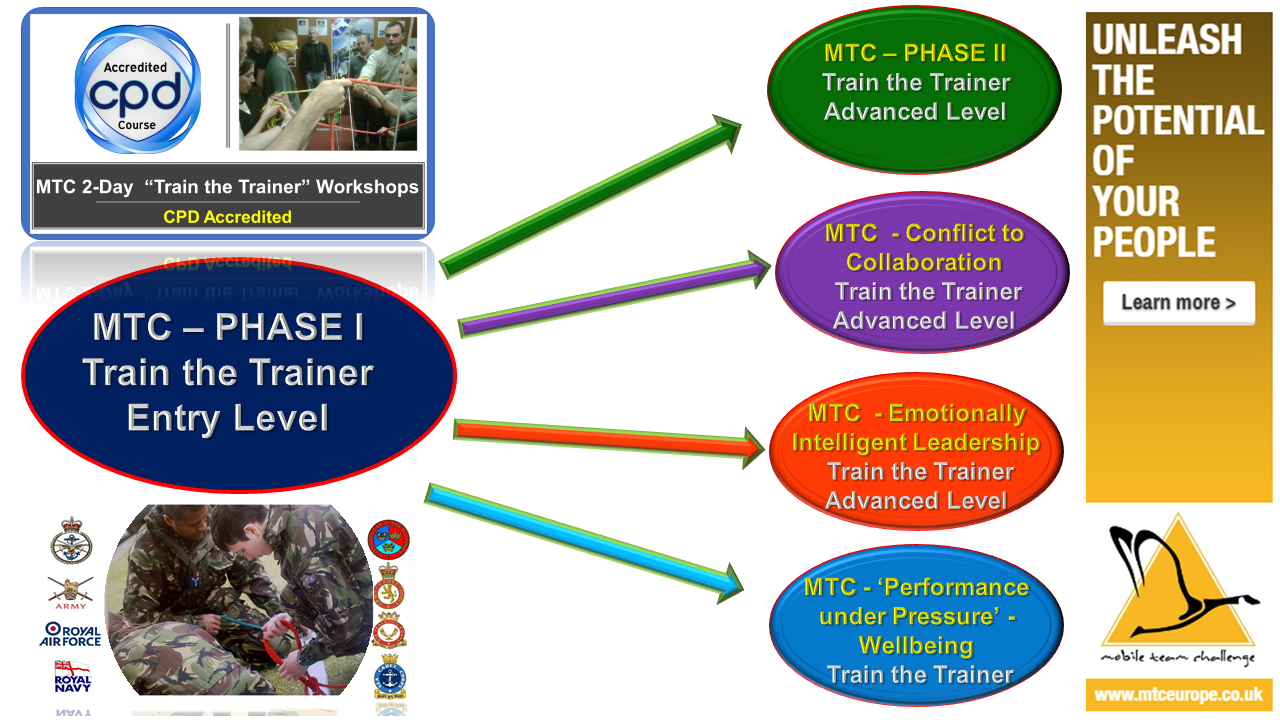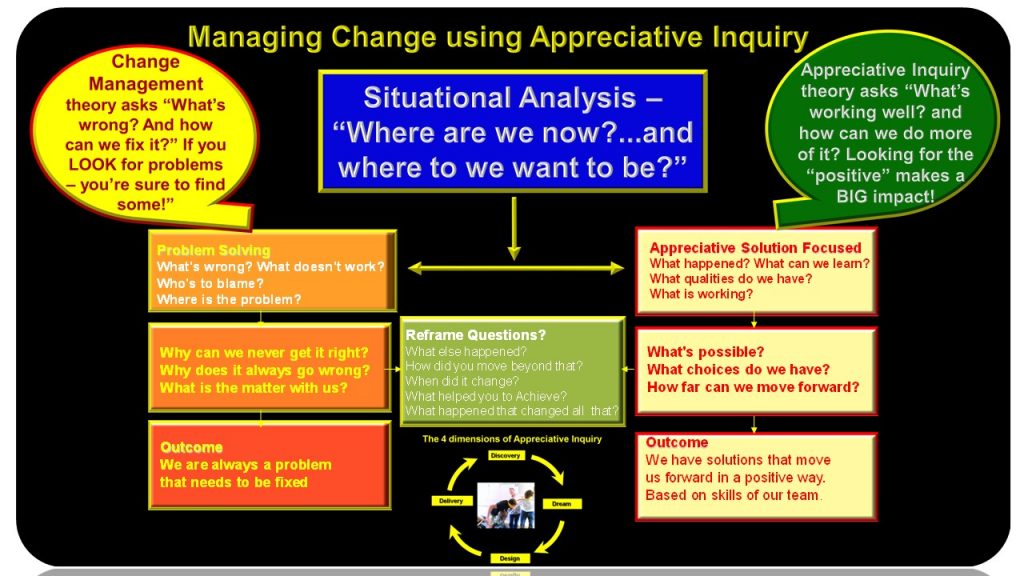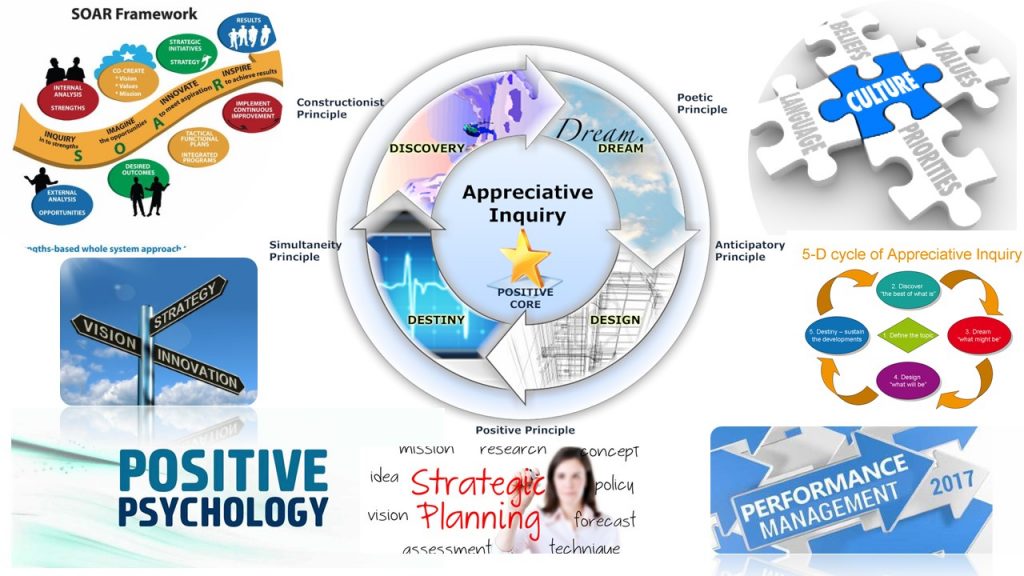train the trainer
MTC “Train the Trainer” Phase I Facilitator Training – 2 Days on-site
This Phase I qualification is the Entry-Level Course which enables the delegates to progress their learning and development skills and to allow them to access these other courses.
After attending initial Phase I training, your options are to advance to Phase II Facilitator Training, or Conflict to Collaboration Training, the higher level of Emotional Intelligence Training (“When Military Intelligence meets Emotional Intelligence”) and our Performance under Pressure Course focussing on building Stress Resilience and Wellbeing.

All of these courses are CPD Accredited with 16 learning hours / points.
- Phase I – 2 Day Course Content – Delegates will:

- Learn and practice the principles of Advanced Appreciative Inquiry Review techniques
- Familiarise themselves with the MTC activities
- Cover Health and Safety aspects of the kit
- Cover PTLLs Principles of Course Delivery
- Develop an understanding of the Physical, Environmental, Emotional and Personal challenges experienced during an MTC activity.
- Become familiar with the MTC “Challenge by Choice” Concept and Experiential Learning Techniques
- Learn how to apply Appreciative Inquiry Facilitation and Review Techniques
- Learn how to design an outcomes-based MTC session
- Explore and demonstrate how to accommodate Learning Styles
- Learn how to design and to deliver a Motivational Workshop
- Learn how to handle “difficult or non-responsive” delegates
Cost for up to 12 delegates = £1,940.00 + VAT
Includes all materials, workbooks, certificates and Trainer’s expenses but excludes VAT
David Cooperrider – The Founder of Appreciative Inquiry – said…. “Appreciative Inquiry is a way of THINKING, SEEING and ACTING to bring about powerful, purposeful, change. Focusing on the Positive and Desired Future results and not the negative past results.”
Whether you are a Learning and Development Facilitator, a Leader of Change or responsible for Strategic Development and Direction within your Organisation, the Principles of Appreciative Inquiry are vital for your professional development in our current times. Email us now for your in-house A.I. Workshop
Click Here for an Overview of our Professional Facilitator Training utilising Appreciative Inquiry
train the trainer
- Phase II – 2 Day Course Content – Delegates will:
Need to have successfully completed MTC Phase I training before completing the Phase II course
All of these courses are CPD Accredited with 16 learning hours / points.
- Practice the advanced principles of Appreciative Inquiry and the 4D Review techniques
- Update themselves with the new MTC activities

- Learn the basic principles of Emotional Intelligence and how to apply E.I. to MTC activities
- Learn how to apply the outcomes and principles of Situational Leadership, Emotional Intelligence, John Adair’s Action Centred Leadership through MTC activities
- Learn how to create Trust, Respect, Diversity awareness, increased self esteem, behavioural and attitudinal change and motivation using Emotional Intelligence.
- Learn how to create High Performance Teams using The 7 Dysfunctions of a Team
- Learn the basic principles of NLP communication techniques
Cost for up to 12 delegates = £1,940.00
Includes all materials, workbooks, certificates and Trainer’s expenses but excludes VAT
David Cooperrider – The Founder of Appreciative Inquiry – said…. “Appreciative Inquiry is a way of THINKING, SEEING and ACTING to bring about powerful, purposeful, change. Focusing on the Positive and Desired Future results and not the negative past results.”
Whether you are a Learning and Development Facilitator, a Leader of Change or responsible for Strategic Development and Direction within your Organisation, the Principles of Appreciative Inquiry are vital for your professional development in our current times. Email us now for your in-house A.I. Workshop
Click Here for an Overview of our Professional Facilitator Training utilising Appreciative Inquiry
train the trainer
Likely Cost: £1,940 for 12 people for 2 days
Conflict to Collaboration – This course is available for MTC Clients who have purchased the Conflict to Collaboration Upgrade Kit.
2 Day Course Content
All of these courses are CPD Accredited with 16 learning hours / points.
- Need to have successfully completed MTC Phase I training before completing the Conflict to Collaboration course
- Learn and practice behavioural change triggers
- Learn the Causes and Triggers of Conflict

- Complete a personal Conflict Style psychometric profiling
- Learn how individuals address Conflict
- Learn the Emotional Intelligence response to Conflict
- Learn and practice the advanced principles of Appreciative Inquiry Review techniques
- Learn how to understand the 4 temperament basics
- Familiarise themselves with the MTC Conflict to Collaboration activities
- Learn how to apply Restorative Justice with MTC activities
- Learn how to use the Lencioni Conflict Resolution model
- Undergo a personal bio-rhythm test to demonstrate brain patterns under stress and conflict
- Learn how to re-frame Conflict
- Cover Health and Safety aspects of the kit
- Cover emotional health and safety aspect of the Conflict to Collaboration kit
- Learn how to design an outcomes-based MTC Conflict to Collaboration session
- Explore and demonstrate the 10 Steps of Reducing Offending Behaviour with Mobile Team Challenge
David Cooperrider – The Founder of Appreciative Inquiry – said…. “Appreciative Inquiry is a way of THINKING, SEEING and ACTING to bring about powerful, purposeful, change. Focusing on the Positive and Desired Future results and not the negative past results.”
Whether you are a Learning and Development Facilitator, a Leader of Change or responsible for Strategic Development and Direction within your Organisation, the Principles of Appreciative Inquiry are vital for your professional development in our current times. Email us now for your in-house A.I. Workshop
Click Here for an Overview of our Professional Facilitator Training utilising Appreciative Inquiry
train the trainer
Appreciative Inquiry (AI) can be described as an approach which draws from positive psychology and storytelling, to create an “alignment of strengths” that render weaknesses irrelevant (Peter Drucker in TEDx Talks, 2014), hence empowering individuals and facilitate the resolution of given problems to enact desired change.
By using a strengths-based approach of inquiry throughout an organisation, AI helps individuals, teams and businesses become sources of positive change in the world, showing by example, that even the largest businesses and organisations can lead positive innovations to improve the lives of employees, customers, suppliers and communities.

The Launch and Further Development of Appreciative Inquiry.
Initially developed at Case Western Reserve University’s department of Organisational Behaviour, Appreciative Inquiry was initially created in 1987 by David Cooperrider and Suresh Srivastva. Since 2000, the original founders of Mobile Team Challenge, Rainey Weisenburger and Cheri Torres, have been working with David Cooperrider in the application of A.I. to experiential learning concepts and the ongoing development of the concepts and have authored several books with Cooperrider.

In the early 2000’s Mobile Team Challenge held several, national, Appreciative Inquiry Conferences in the UK and were one of the original initiators of A.I. into the UK.
Called “the best large-group method in the world today,” AI stands out among other Organizational Development theories due to its scalability and generativity. AI methods have been demonstrated to:
- Increase profits, while at the same time improving the world.
- Show businesses the bigger picture, including their place in the world from a sustainability point of view.
- Allow employees to be more creative and to have more buy-in with the company’s strategic plans.
- Improve efficiency and output due to the revitalized commitment and enthusiasm from both employees and management for the company’s mission.
- Engage entire communities in creating improvements in their region.
- Work across all types of organisational sectors, from for-profit to the social sector.
AI helps organisations discover the values of their stakeholders and create an aligned vision and mission based on those values. Through the process, organizations can discover key strengths, new product or service opportunities, cost savings and increased earnings. Appreciative Inquiry not only produces better results, but happier people.
Managers and leaders face complex challenges and the need for change on a regular basis. Most of the strategies we have used in the past for problem-solving and decision-making, however, are inadequate for handling complex problems and continuous change. How do we manage problem-solving and change in today’s world?

Whole System Engagement
One of the most widely-used approaches for complex problem-solving is ‘appreciative inquiry’ (AI). AI is a strengths-based practice that engages whole systems in searching for the best of what is, dreaming what might be, designing pathways to live into dreams, and co-creating the future through cycles of action and learning. What makes AI unique is its grounding in social constructionism. This is the notion that we create our social systems through our shared conversations and meaning-making. At some point in the past, we created the current system as our best guess for what would support success. If the current system is no longer supporting success, we can redesign it by having a conversation worth having. Two simple appreciative inquiry practices make this possible: ‘generative questions’ and ‘positive framing’.
Generative Questions
A ‘generative question’ is one that changes the way people think. It creates a compelling image that inspires new possibilities and action. These questions inspire us to think outside of our ordinary frame and to challenge our assumptions.
Positive Framing
The second practice is ‘positive framing’: focus on what you want—the desired outcome(s) instead of the problem. For example, instead of focusing on fixing low performance, study high performance. What are high- performing teams doing that could be replicated? Instead of fixing turnover issues, have conversations with those who are engaged and committed. What can you learn from them?
The Appreciative Inquiry Leader
Creative ideas and solutions emerge in appreciative and inquiry-based conversations. These two AI practices enable teams to respond effectively and with agility to both complex challenges and continuous change. And a manager’s capacity to create high performing cultures is enhanced by using these practices to foster ‘conversations worth having’ anytime, anywhere, and in any situation.

The applications of Appreciative Inquiry are numerous:
- Advanced Reviewing Techniques for Experiential Learning Activities for Individuals and Teams
- Solutions-Focussed appreciative conversations for use in counselling, coaching, mentoring and performance management
- Key Account Development and Sales Enablement interactions
- Strategic Planning and Vision-Setting days
- Conflict to Collaboration – Conflict Resolution Interventions
- Interventions with Offenders / Prisoners
Applications of AI within the UK delivered by Mobile Team Challenge
- 38 NHS Foundation Trusts (4,000 NHS employees trained to date) have used AI Strategic Planning sessions to “Dream” the perfect “10 out of 10” of Patient Experience Excellence
- 50+ RAF, Army, Navy and MOD Tri-Services locations totalling 5,500+ military employees have been trained in Appreciative Inquiry Facilitation, Team Working and Appreciative Leadership.
- The BBC commissioned MTC in 2007 to design a Vision for 2020 where AI concepts were utilised to “Dream” the BBC’s 15 year plan. We are still seeing many of the plans from the 2007 planning session coming to fruition – e.g. the moving of the BBC Sports Department to Manchester and the consideration of removal of the “licence fee” are just 2 of the “dreams” which were created during our session.
- 30+ of MTC’s Local and Central Government Customers have utilised AI for Culture Change and Strategic Planning during our workshops
- Almost 50 HMP Prisons, Young Offenders and Home Office initiatives (e.g. Knife Crime Community Action Groups etc) have been trained to utilise the 5 D’s of AI to great effect with one particular AI programme resulting in a case where 15 prisoners have not re-offended over 3 years after attending the MTC sessions. (Further information of AI in Prisons and detention centres can be found here https://omtcweb.mtceurope.co.uk/sectors/prisons/)

Delegates Will:
- Identify and learn how to apply and teach the principles of Appreciative Inquiry
- Identify how to deliver Strategic Planning and Visioning Days using these inspiring techniques
- Identify the positive outcomes by applying AI to Conversations, Performance Reviews, Interventions and Coaching Sessions
- Learn techniques which are motivational and inspirational
- Practise how to facilitate a Strategic Planning and Visioning Workshop utilising the AI principles
- Learn how to “Dream” and “Design” Strategic Planning Action Plans and SMART Goals
- Learn how to create and use Generative Questions
- Learn the 5 Principles of AI – The Constructionist Principle, The Poetic Principle, The Anticipatory Principle, The Positive Principle, The Simultaneity Principle and the power of the Positive Core
- Explore the unleashing potential of positive reframing and learn hot to create winning behaviours and mindsets
- Identify how we can achieve the “positive mindset” in the Workplace
- Learn the tools to “Discover, Dream, Design and Deliver” efficient Culture Change programmes
- Learn how to deliver David Cooperrider’s Appreciative Inquiry Model

SO….whether you are looking for a Train the Trainer Course to learn how to deliver Strategic Planning… or Positive Reframing… or Appreciative Coaching… or Conversations Worth Having… or Professional Intervention Skills or Appreciative Advanced Facilitation skills – please contact us and we would love to talk to you about your specific requirements.

train the trainer
Likely Cost: £1,940 for 12 people for 2 days
Emotional Intelligence – 2 Day Course Content
When Military Intelligence meets Emotional Intelligence
All of these courses are CPD Accredited with 16 learning hours / points.
- Need to have successfully completed MTC Phase I training before completing the Emotional Intelligence course
- Practice the advanced principles of Appreciative Inquiry and the 4D Review techniques

- Update themselves with the MTC activities which are focussed on enhancing Emotional Intelligence
- Learn the principles of Emotional Intelligence and how to apply E.I. to MTC activities
- Learn the impact of intra and inter-personal Emotional Intelligence
- Learn how to deliver the key principles of Daniel Goleman’s Emotional Intelligence and how to coach delegates’ to apply the learning into their daily duties.
- Learn how to deliver MTC activities to demonstrate the 8 Emotional Intelligence Behaviours
- Receive a personal Emotional Intelligence Profile Report – recognised and endorsed by the British Psychological Society (An Optional feature of this course is for each delegate to complete a British Psychological Society questionnaire creating a 29-page personalised E.I. profile at a cost of £45.00 + VAT per delegate – this also includes a 1-to-1 coaching review with each delegate)
- Learn how to map out the Emotional Intelligence of Teams, Departments and Organisations
Click Here to view a Sample E.I. Profile – When Military Intelligence meets Emotional Intelligence
How do your 8 Emotional Intelligence Behaviours hold up when you are working under stressful conditions?
